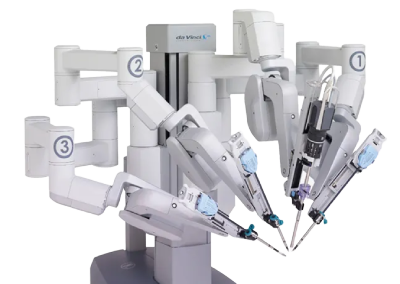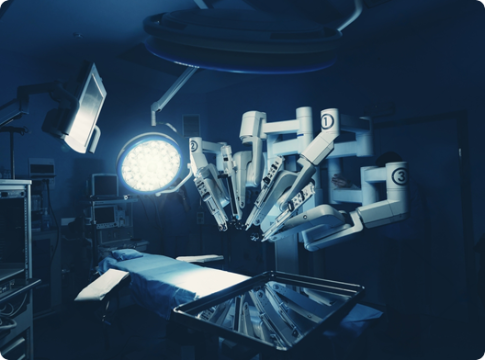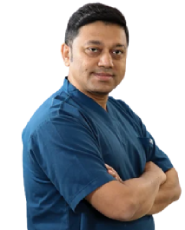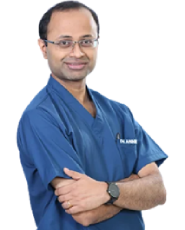Robotic Surgery, commonly referred to as robot-assisted surgery, is a surgical technique in which treatments are carried out using robotic devices
More than 250 Robotic surgeries done within a year of Installation at Medica.

Robotic surgery, commonly referred to as robot-assisted surgery, is a surgical technique in which treatments are carried out using robotic devices. Highly skilled surgeons use cutting-edge computer systems to operate the robots with incredible precision and accuracy.
Robotic surgery is often used for minimally invasive operations that only call for minor incisions, such laparoscopic surgeries. The surgical robots used in these procedures are outfitted with tiny cameras and surgical tools that provide the physician a clear view inside the body and enable precise and controlled tissue treatment.
Robotic surgery is the term used to describe surgical procedures performed under the direct supervision of medical specialists. Advantages of Robotic surgery makes the procedure unique. For more robotic surgery information and treatment from the best robotic surgery hospital in India, connect at Medica.
Robotic technology offers more precision and accuracy as compared to traditional surgical techniques, which can reduce the risk of problems.
Smaller incisions are routinely used during robotic surgery in kolkata to reduce scarring and hasten patient recovery.
Because robotic surgery is accurate and precise, less blood is lost during the procedure.
Because of the smaller incisions and less harm to the surrounding tissue, patients who have robotic surgery usually report feeling less pain and suffering.
It may be simpler for surgeons to access challenging-to-reach areas with robotic surgical systems equipment because they can move in ways that are not possible with traditional surgical tools.
Because the robotic surgical system equipment is frequently sterilised in between uses, impact of robotic surgery for cancer can help lower the risk of infection.
Research has demonstrated that robotic surgery can produce better results and less postoperative problems than conventional surgical methods.
Robotic technology offers more precision and accuracy as compared to traditional surgical techniques, which can reduce the risk of problems.
Smaller incisions are routinely used during robotic surgery in kolkata to reduce scarring and hasten patient recovery.
Because robotic surgery is accurate and precise, less blood is lost during the procedure.
Because of the smaller incisions and less harm to the surrounding tissue, patients who have robotic surgery usually report feeling less pain and suffering.
It may be simpler for surgeons to access challenging-to-reach areas with robotic surgical systems equipment because they can move in ways that are not possible with traditional surgical tools.
Because the robotic surgical system equipment is frequently sterilised in between uses, impact of robotic surgery for cancer can help lower the risk of infection.
Research has demonstrated that robotic surgery can produce better results and less postoperative problems than conventional surgical methods.
The DaVinci Surgical technology/Robot is a robotic-assisted surgical technology that enhances the capabilities of surgeons during minimally invasive surgeries. At the patient’s side is a cart with robotic arms holding surgical instruments, a high-definition 3D vision system that provides a magnified image of the surgical site, and a console where the surgeon controls and operates.
Contact the top oncologist in Kolkata at Medica Superspecialty Hospital, for robotic surgery in india to learn more about the process, treatment and cost of robotic surgery.

Cancers that start in the female reproductive system are referred to as gynaecological cancers. These cancers include vulvar, vaginal, cervical, uterine, and ovarian cancers. The signs, risks, and treatment choices of robotic surgery in kolkata vary depending on the type of cancer.
Asymptomatic in its early stages, ovarian cancer develops in the ovaries. Pelvic pain, bloating in the abdomen, and trouble eating are possible symptoms. A family history of the condition, specific hormonal variables, and genetic alterations are among the risk factors for ovarian cancer. Chemotherapy and surgery are frequently used in treatment.
Human papillomavirus (HPV) is a common cause of cervical cancer, which develops in the cervix. Early signs can include discharge, pelvic pain, and unusual vaginal bleeding. Regular Pap tests and HPV vaccination are two prevention strategies. Surgery, radiation, or chemotherapy are all possible forms of treatment.
The majority of cases of uterine cancer are found in women over 50. It develops in the lining of the uterus. Unusual vaginal bleeding, pelvic pain, and a pelvic mass are possible symptoms. Diabetes, obesity, and particular hormonal variables are risk factors. Surgery, radiation therapy, or hormone replacement are frequently used as treatments.
Both vulvar and vaginal cancer are uncommon, and older women are more likely to be diagnosed with both. Itching, discomfort, and unusual vaginal bleeding are among symptoms that may be present. Surgery, radiation, or chemotherapy are all possible forms of treatment.
Regular Gynaecological exams and Pap smears are important for early detection and prevention.
The treatment of gastrointestinal cancer has been transformed by robotic surgery. Even for complicated tumours in areas like the pelvic cavity (rectal cancer), minimally invasive surgery has become possible and safer thanks to robotic surgery’s superior optics, better manoeuvrability, and scaled movements. Other complicated procedures can also be carried out through a few tiny abdominal incisions, including procedures for pancreatic, stomach, and colon cancers. These procedures reduce post-operative discomfort, speed up recovery, and leave behind very small scars.
Robotic surgery has had a significant positive impact on the treatment of thymomas and other mediastinal tumours as well as thoracic (chest) cancers such lung cancer and esophageal (food pipe) cancer. Robot assisted surgery avoids making major incisions on the chest, which considerably reduces the postoperative pain. This makes breathing easier and lowers the risk of problems like pneumonia and lung collapse. Given the complexity of most thoracic onco-surgeries, robotic surgery in india has helped patients recover more quickly from surgery with less tissue damage and fewer problems.
Malignant tumours that form in the urinary system’s organs, such as the kidneys, bladder, prostate, testicles, and ureters, are referred to as urologic malignancies. Numerous symptoms, including blood in the urine, pain when urinating, frequent urination, and difficulty passing urine, can be brought on by these cancers.
Since the prognosis is typically better when the cancer is detected at an early stage, early detection is crucial in the treatment of urologic cancers. Depending on the kind, stage, and location of the cancer, treatment options for urologic cancers may include surgery, radiation therapy, chemotherapy, and targeted therapy. Early detection and management of urologic malignancies might be aided by routine screening and rapid medical intervention.
Head and neck cancers are a group of tumours that affect the mouth, throat, nasal cavity, sinuses, salivary glands, and lymph nodes in the neck. These malignancies, which are also known as squamous cell carcinomas, frequently develop from the epithelial cells that line the mucosal surfaces of these structures.
Use of cigarettes and alcohol, HPV infection, exposure to certain chemicals and radiation, and nicotine and alcohol use are the main risk factors for head and neck cancers. A lump in the neck, a prolonged earache, a persistent painful throat, trouble swallowing, and hoarseness are a few symptoms that can occur.

Urology, Robotic Surgery

Gynecologic, Robotic Surgery

Surgical Oncology
Robotics in surgery has a number of benefits. The robot can execute surgical duties with more precision and accuracy, as well as a wider range of motion and dexterity. The robot can also be taught to carry out specific duties on its own, lowering the possibility of human error and enhancing surgical outcomes. Robotic surgery can also provide patients with less intrusive surgical choices, which can result in less discomfort, scars, and a quicker recovery.
Depending on the technique being performed and the complexity of the patient’s condition, robotic surgery can take anywhere from a few minutes to several hours.
Some straightforward operations, like a prostatectomy or hysterectomy, can be finished in a matter of hours. The duration of more complicated treatments, such heart surgery or liver surgery, can extend to many hours or perhaps a whole day.
Robotic surgery has some advantages over laparoscopy because it enables more precise movements and better access to difficult-to-reach areas. Furthermore, the use of robotics can give surgeons more stability and control during delicate procedures.
Yes. Particularly when compared to other surgical methods, robotic surgery is regarded as one of the safest solutions. Additionally, it offers decreased radiation exposure, infection risk, and tissue damage.
Yes. Robotic procedures ensure a more rapid recovery, a shorter stay in the hospital, and a quicker return to work and daily activities.
A premier medical facility with a cutting-edge philosophy, Medica Oncology of Robotic Surgery strives to provide every patient with superior treatment and cutting-edge technology. Additionally, it includes the best robotic surgeons in Kolkata who are proficient about the most recent technology and perform delicate procedures with precision, adaptability, simplicity, and effectiveness.